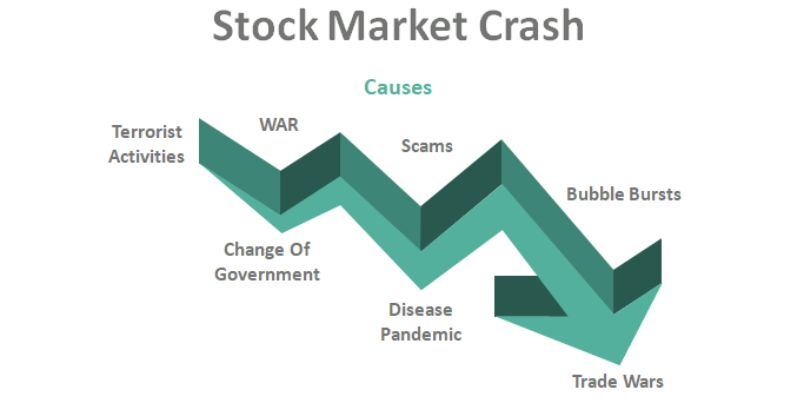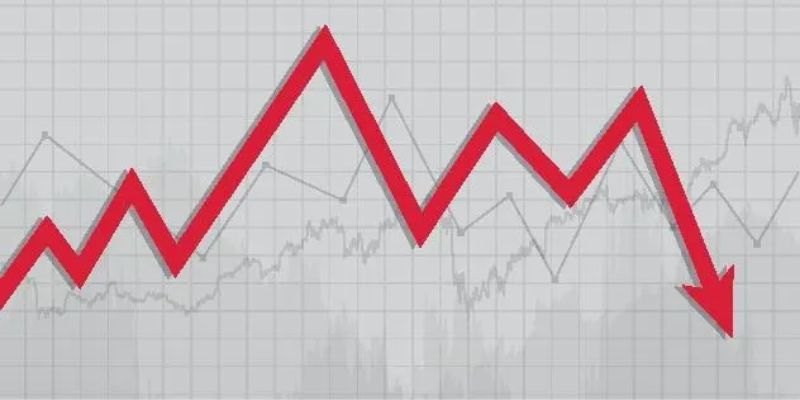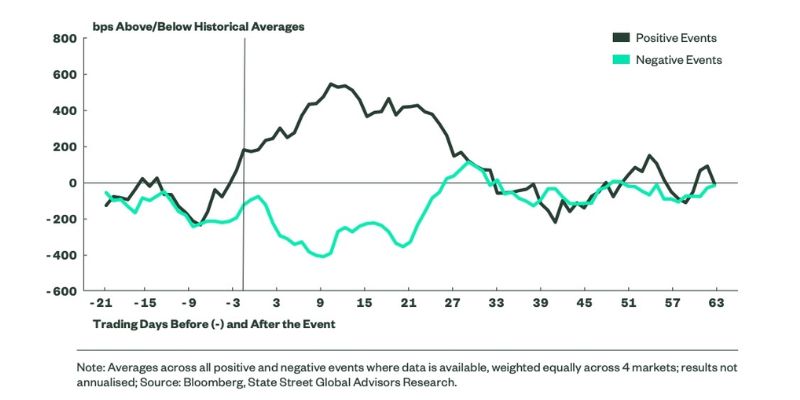Economic factors causing stock market crash often lurk beneath complex market data. But what sets them off? Sometimes, it’s the sting of rate hikes; other times, red flags wave in indicators we trust. This post pulls back the curtain on economic movements that send markets tumbling. We’ll dive into how cold, hard policy moves shake investor nerves and why key indicators are the fortune-tellers of Wall Street. Expect a lowdown on how job numbers and corporate debt silently shape your portfolio’s fate. And let’s not overlook the outside forces—those breaking news alerts that make traders hit sell. Ready for the truth? Let’s decode the economic DNA of market meltdowns.
The Role of Monetary Policy in Stock Market Stability
The Impact of Interest Rate Hikes
Interest rate hikes mean loans cost more. People and businesses slow spending. The stock market feels this. Stocks can drop as a result. Companies may profit less when loans are costly. This makes their stocks less appealing. Interest rates up often come when inflation is high. The aim is to make prices stable. Yet, this can slow down the economy, too. It is a delicate balance to keep.
Interest rates matter a lot for the market. Rising rates can cause stock declines. But they also help control runaway prices. It’s important to watch these changes.
Federal Reserve Policies and Market Reactions
The Federal Reserve sets the tone for our economy. Its policies impact how much money is in our pockets. And how well our businesses do. When it hints at changes, the market listens. And sometimes, it panics.
The Fed has a big toolbox to manage growth. It can hike rates or lower them. It can buy or sell bonds. All this affects how the market moves. When it shifts policies, money flows change. This can shake up our investments.
Loans get costlier when the Fed tightens up on money. Businesses invest less. Jobs can get harder to find. People spend less. Stocks can then take a hit. The reverse is also true. When money is cheap, the market often jumps.
The Fed’s words alone can sway the market. If it speaks of risks ahead, stocks often fall. When it’s optimistic, the market might soar.
In short, the Fed’s choices shape our financial world. They’re powerful signals for the market’s health. Understanding them helps us predict market moves.

Economic Indicators and Stock Market Performance
Recession Indicators as Predictive Tools
Recession indicators tell us when the market might crash. They include unemployment rates and GDP growth. When these look bad, it often means stocks will too. The stock market dislikes bad news. Higher jobless numbers scare investors. So do drops in GDP. Both hint at a recession. That’s a time when the economy slows down. It makes sense, right? Fewer jobs mean folks spend less money. Companies make less cash. Stocks then lose value.
Interest rates tell us about recessions too. When rates go up, loans cost more. People and companies borrow less. This can slow down the economy. It’s a tricky dance. Central banks, like the Federal Reserve, adjust these rates. It’s to manage inflation and keep the economy stable. But get this — wrong moves can hurt the stock market.
Some say a stock market bubble is brewing when things look too good to be true. Like when stock prices keep jumping way more than profits. This happened during the tech bubble. Remember that? It eventually burst. And it was messy for investors.
So, tracking these indicators help us spot trouble early. We look at the signs and ready ourselves for what could come next.
The Consequences of High Inflation Rates on Equities
Inflation’s like a sneaky thief. It creeps up and steals money’s worth. When prices rise, your dollars buy less. Imagine paying more for a carton of milk every week. Now apply that to everything. That’s inflation. High inflation freaks people out. It hits companies too. Materials cost more. So, they might sell less. Or they raise prices, and then we pay more.
Stock values feel the heat. Inflation can eat up profits. Companies don’t do as well if costs are up and sales down. Investors watch carefully. They may sell their stocks if they worry too much. This selling can cause stock prices to drop fast. It’s not just guesswork.
Data shows this pattern. We’ve seen it before: high inflation often leads to lower stock prices. So, it’s important to watch inflation rates. They can signal tough times for stocks.
As I weave through the intricate world of economic signals, each piece of data unfolds like a map, pointing to the peaks and pitfalls that could shape the financial landscape. Like a skilled navigator, I remain ever vigilant, alert to the merest hint of change in the wind, ready to advise those who seek to weather the stormy seas of market volatility. Understanding the power that economic indicators hold within their numbers feels like decoding a secret language, one that whispers of impending stock market shifts, allowing us to take action before they strike with full force.

Structural Economic Challenges and Market Valuations
The Ripple Effect of Unemployment Rate on Investment Confidence
Jobs matter. When folks don’t work, they don’t spend. Simple, right? Fewer jobs mean scared people. And when people get scared, so do their wallets. They stop buying. Then, companies make less money. Imagine what that does to their stocks!
Now, people ask, “How does job loss hit stocks?” Easy answer: Badly. Fewer jobs mean less money for everyone. People buy less, and companies earn less. Stocks then drop because the company value goes down. It’s like a line of dominoes. One falls and they all start tumbling down.
Companies try to make more money. They may cut costs or find new ways to sell things. But when jobs keep disappearing, that’s hard. It gets folks worrying about a “recession.” That’s when the economy slows down for months.
Who decides if jobs grow or not? Well, part of the answer is the “central bank.” In the U.S., that’s the Federal Reserve. They make money cheap to borrow (that’s “low interest rates”) or expensive. Their choice can make jobs come or go.
Low interest rates usually help jobs grow. But when rates get too low, trouble can brew. It can make a “stock market bubble.” That means stocks cost more than they should. And what goes up too high must come down.
Corporate Debt Levels and Their Influence on Stock Prices
Now, let’s chat about big companies and their debts. Imagine you have a friend, Joe. Joe likes to borrow cash. A lot of it. He borrows more than he earns. That’s not good.
Big companies can be like Joe. They borrow piles of money. For a while, they grow and grow. Their stocks soar up. But if they can’t pay back what they owe, uh-oh. Trouble hits. Their stocks could nosedive.
So, what tells us if a company has taken on too much debt? We look at “corporate debt levels.” That’s a fancy way of saying how much they owe. If it’s a huge pile, watch out.
High debt can scare investors. They think, “Can the company pay this back?” If they doubt it, they sell their stocks. Selling a lot brings prices down. It’s called “market speculation.” Folks guess what might happen.
Sometimes, companies with big debts get lucky. They pay it off and keep growing. Other times, not so much. They may cut jobs or go broke. And when they struggle, so do their stocks.
There’s a lot of talk about “fiscal policy” too. That’s government spending and taxes. The right moves can help companies with debt. The wrong ones? Not so much.
It’s a big web. Jobs, debts, spending, taxes – they’re all linked. And they all play a huge part in whether stocks rise or fall. So, keep an eye on them. They could tell you what’s next for your cash.

External Shocks and Investor Behavior
Market Speculation and the Creation of Asset Bubbles
Think of a bubble as a balloon. When too much air goes in, it pops. The same goes for stock markets. When prices soar way above their real worth, we call this a market bubble. Folks get really excited about stocks and start buying more than they should. They think the prices will keep going up forever. But this can’t happen. More buyers mean higher prices, not because companies are doing better, but because people think they are.
When too many of us bank on prices rocketing, trouble brews. This excitement ignites speculation. What’s that? It’s when people buy stocks just to sell them later for profit. It’s not about how good the company is. It’s about quick money. This game works for a while, but not forever.
When folks wise up and realize stocks are overpriced, they stop buying. Some even start selling. Lots of people selling means those high prices plummet. And pop! The bubble bursts. That’s when stock prices fall down to where they really should be. It can happen fast. When it does, many lose a lot of money.
Now, bubbles don’t just grow out of nowhere. Lots can feed them. Low interest rates are one big dish on the menu. When borrowing money is cheap, people can buy more stocks. They think, “Hey, let’s get a loan and invest.” And they do. But they’re not the only ones. Companies borrow heaps, too. They buy their own stocks, which pushes up prices even more. Kind of like adding more air to our balloon, right?
Then there’s our trusty new inventions and ideas. Remember the dot-com boom? That was all about the internet changing the world. Investors thought every internet company would make them rich. Let’s not even start on the housing market before 2008. Folks thought house prices would climb forever. Banks gave loans to just about anyone. Those were bubbles all set to burst. And burst they did.
Investor Panic Selling in Response to Political and Economic News
News can be a big stirrer in the stock pot. When things look grim, like a big country spat or a company going belly up, people worry. They think, “What if all the stocks crash?” So, they sell. Fast. This panic selling can spread like wildfire. If one person sells thinking prices will drop, others follow. Before you know it, everyone’s selling.
It’s not just fear of losing money. It’s more like not wanting to be the last one standing when the music stops. This rush to the exit can crash prices like a wrecking ball. And it can start from just a small bit of news. Imagine a rumor about more rules coming for banks. This could scare investors.
Now, picture this happening worldwide. That’s right, fear crosses borders. If one country’s market wobbles, others feel the shakes, too. And it’s especially true if the trembling start in a big, mighty land. I’m talking about places like the USA, where what happens can touch every corner of the globe.
It’s kind of like dominoes. One falls and knocks down the next. Each chunk of bad news can tip another, until it’s a heap of tiles on the floor. That’s panic selling for you. It’s powerful, spreads fast, and sometimes, a little bit of news is all it takes to set it off.
We’ve explored how money rules can sway stocks. High interest makes the market twitch. The Fed’s choices cause big ripples, too. We saw how bad news can urge people to sell fast, and how bubbles can form when they guess prices will jump.
Next, we checked out signs that hint at a downturn, like how many people are without jobs. When prices climb too fast, stocks feel it. Big company debts can make their stock cost less.
Last, we talked about huge sudden changes. These start a chain of events. They can make people anxious and lead to a quick sell-off.
To sum it up, many things mix to shape stocks. It pays to keep an eye on them. By understanding these, you can be smart about where and when to invest. Stay sharp, and use what we’ve covered to make choices that help your money grow.
Q&A :
What are the primary economic factors that can lead to a stock market crash?
Economic factors play a significant role in the health of the stock market. Key triggers for a crash often include high inflation rates, soaring interest rates, and a sudden economic slowdown or recession. Excessive speculation and high levels of debt among investors and companies can amplify these problems, potentially leading to a market correction or crash. Additionally, geopolitical events or changes in government policy can precipitate a crisis if they negatively impact investor confidence or disrupt international trade.
How does inflation influence stock market performance?
Inflation can have a profound impact on stock markets, primarily because it affects corporate profits and consumer spending. When inflation is high, the purchasing power of consumers decreases, leading to reduced spending. In response, companies may see lower profit margins. To combat inflation, central banks may raise interest rates, increasing the cost of borrowing and potentially slowing down economic growth, which can in turn lower investor confidence and stock prices.
Can international trade disputes cause a stock market crash?
Yes, international trade disputes can significantly affect the stock market. When two or more countries engage in a trade war, imposing tariffs and trade barriers, it can disrupt global supply chains, increase costs for businesses and consumers, and reduce international trade volumes. The uncertainty and potential economic slowdown resulting from trade disputes can negatively impact company earnings and investor sentiment, leading to declines in stock market indices.
What role do interest rates play in stock market fluctuations?
Interest rates are a critical factor in the valuation of stocks. Generally, when interest rates are low, stocks become more attractive to investors because the cost of borrowing is cheaper, allowing businesses to invest more in growth. However, when central banks increase interest rates to control inflation or stabilize currency, this can make borrowing more expensive and reduce corporate profits. Higher interest rates also make bonds and other fixed income investments more appealing compared to stocks, potentially triggering a sell-off in the stock market.
How does investor sentiment affect the stock market, and can it cause a crash?
Investor sentiment, or the overall attitude of investors toward the market, can significantly influence stock prices. If investors believe the market will rise, their optimism can lead to increased buying and higher stock prices. Conversely, negative sentiment can result in widespread selling and a market downturn. Extreme pessimism can lead to panic selling, which can exacerbate market volatility and contribute to a crash. Market sentiment is influenced by a variety of economic indicators, company performance data, and geopolitical events, amongst other factors.

